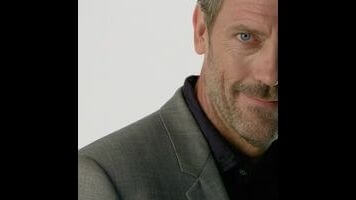House: "Broken"

When House first started back in 2004, it had a simple but compelling premise: a driven, acerbic doctor played by Hugh Laurie uses his wit to solve the unsolvable. Sure, he was a misanthrope and he said some nasty things to people, but he saved lives, and just as importantly, those "nasty" things were almost always based in some kind of truth. The series had most of the usual cliches of television medical dramas—absurd medicine, stock characters, the occasional banality—but Laurie's lead performance, along with reliably sharp writing, made it stand out. While the first three seasons dealt openly with the frustrations that someone like House could create, on the whole, he tended to win as many arguments as he lost; more, even. There were musical montages, and beautiful moments of the human spirit, but there was also a lot of bleakness and bitter pain for which there was no solace.
But that's a tough balance to walk. On-going series on major networks don't tend to traffic in the soul-searing for very long, and trying to toe the line between popular drama and subversive cynicism took its toll. By the third season, the cracks were starting to show—the David Morse plot-line tipped arguably too far into darkness, and then season 4 was back to distractions with a shiny new team and, gasp, a doctor death. Amber's fatal bus crash was a high-light for the series, but also a sign that the writers were reaching to keep the tension up. Season 5, we get another death, Kutner's suicide (driven by an Kal Penn's abrupt departure from the series, sure, but there were other ways he could've gone), and endless stylistic gimmicks designed to distract us from a general paucity of new ideas. The patients were more outlandish, and House become increasingly apathetic with each episode. So the writers killed off his dad, and then pushed him into a relationship with Cuddy that made no organic sense. And then the hallucinations started.
Things ended on a high note, or at least a strong one—House, realizing he'd had some kind of mental break brought on by a Vicodin addiction and the death of two colleagues, had checked himself into an asylum to come down, clean up, and get well. Which at least meant we might have some kind of change coming. I'm a sucker for that. The problem is, that change means coming down on the easy side of the dilemma at the heart of the series. It means saying not only is House broken, but that he's wrong to be so bitter, and that he needs to be fixed, because society is great, society is good, and hugs will save us all in the end.
"Broken" picks up where that thread left off, and for the first half, I found it nearly unbearable. Opening credits aside (always nice to get something new, especially when it involves Radiohead), this was basically the easiest way to take last season's cliffhanger, sticking our hero in one more of a long line of One Flew Over the Cuckoo's Nest-style loony bins, bouncing him off the easy-to-type freaks, and grinding him down one platitude at a time. There's his wacky, manic depressive roommate (who was more annoying than actually manic), the paranoid guy, the skinny guy, the woman who won't talk—and there's always somebody who won't talk, isn't there, like the most perfect representative of mental illness is a person who responds to social instruction by refusing to participate in any way—we've got the basic checklist here. (Why is there always one of each psychosis? Is there a quota?)
